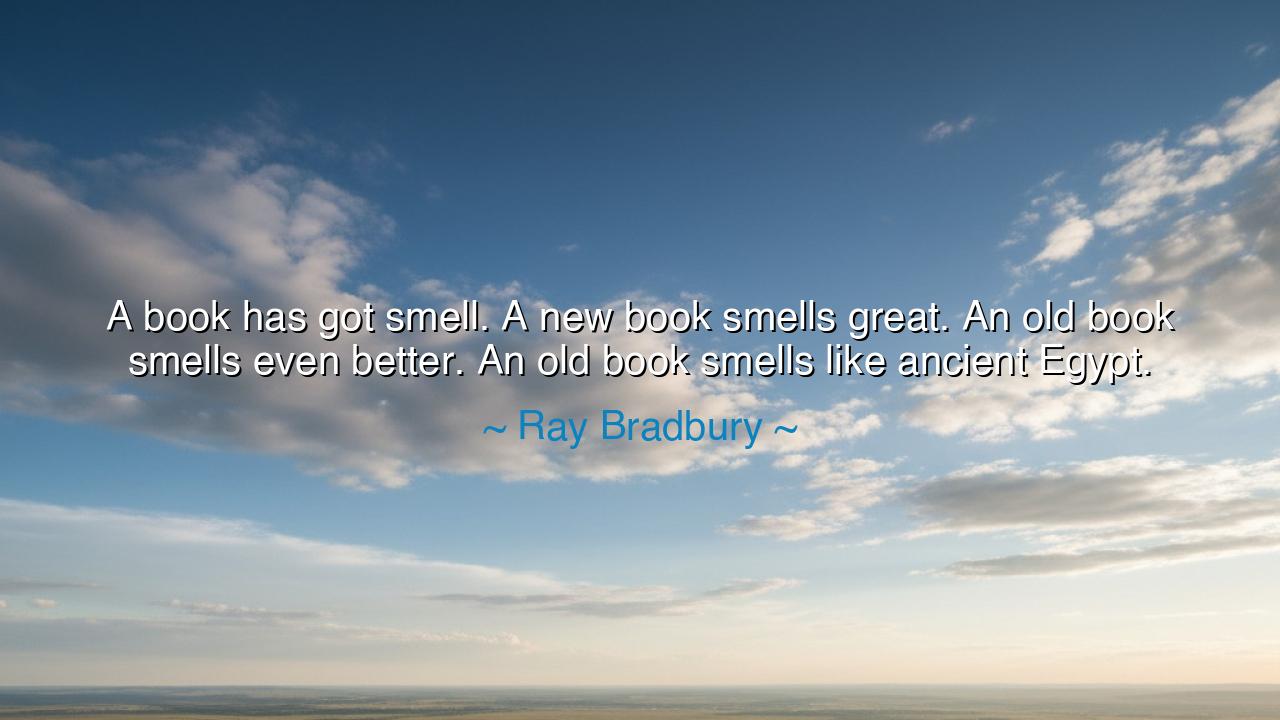
A book has got smell. A new book smells great. An old book smells
A book has got smell. A new book smells great. An old book smells even better. An old book smells like ancient Egypt.






“A book has got smell. A new book smells great. An old book smells even better. An old book smells like ancient Egypt.” — Ray Bradbury
Thus spoke Ray Bradbury, the poet of science and the dreamer of futures past, whose words breathe both the scent of paper and the fragrance of eternity. In this simple, sensory declaration, he unveils a truth that belongs not only to the lover of books but to all who revere the memory of human thought. A book, he says, is not merely a vessel of ink and words — it is a living relic, a sacred object that carries within it the breath of ages. To smell a book is to commune with history, to touch the pulse of civilization itself. For the fragrance of an old book is not only of dust and paper — it is the perfume of time.
The origin of this quote lies in Bradbury’s lifelong devotion to the printed page. He was a man who saw books as living beings, fragile yet immortal, each one a spark of the divine fire of creation. Having lived through an age that threatened to replace books with machines, he wrote his masterpiece Fahrenheit 451 as both a lament and a warning — that the destruction of books would be the destruction of memory, imagination, and soul. Thus, when he speaks of a book’s smell, he speaks as one who has inhaled the spirit of the written word and found within it the essence of humanity.
In comparing the new book and the old, Bradbury touches upon the dual nature of life itself. The new book carries the scent of promise — fresh ink, unturned pages, the excitement of discovery. It is the fragrance of beginnings, of potential yet unrealized. But the old book — ah, that one bears the aroma of wisdom. Its pages, yellowed and softened by years, hold whispers of hands that have turned them, eyes that have wept or widened upon them. To smell an old book is to touch the continuum of minds — those who came before, who read, who wondered, who dreamed. When Bradbury says an old book “smells like ancient Egypt,” he means that in its fibers, time has folded upon itself. It carries the scent of pyramids and parchment, of temples and tombs, of all who have ever sought to preserve thought against the silence of oblivion.
For indeed, the scent of an old book is the incense of civilization. It recalls the monks of medieval Europe, bent over their illuminated manuscripts by candlelight, preserving the wisdom of the Greeks and the faith of the fathers. It evokes the libraries of Alexandria and Baghdad, where scrolls of philosophy and poetry once filled the air with the perfume of ink and papyrus. Every page that survives from those eras bears a lineage — a tangible trace of all who refused to let knowledge perish. Bradbury, ever the prophet of the imagination, understood this: that to love a book is to love the very act of remembering, to resist the tide of forgetfulness that sweeps through every age.
Consider the story of Alexandria, the great library that once stood as the heart of the ancient world. When it burned, the scholars wept not for the buildings, but for the thoughts lost — the smell of wisdom turned to smoke. Yet humanity rebuilt, again and again, through the written word. Bradbury’s image of the old book as “ancient Egypt” reminds us that within every library, within every quiet shelf, there is a resurrection of history. To open a book is to awaken the dead — to breathe again the dreams of those who have gone before us.
The lesson, then, is this: honor the tangible, the real, the written. In an age of fleeting screens and digital ghosts, remember that true knowledge has weight, texture, and scent. A book, whether new or old, is a bridge between minds — and the smell of it is the aroma of connection. Cherish it. Let your fingers trace its spine; let your nose draw in its history. To hold a book is to hold a miracle — the human spirit, bound and preserved against the erosion of time.
So, my child of the future, when you next open a book, do not rush to the words alone. Pause. Breathe. Inhale deeply, and know that you are inhaling the memory of mankind — from the dust of the scribe’s desk to the paper of your hand. Let that fragrance remind you that wisdom is not found only in what you read, but in what endures. A book has got smell because truth, once spoken and recorded, never truly fades. And as long as we can still smell the scent of paper and ink, humanity — with all its dreams and stories — still lives.






AAdministratorAdministrator
Welcome, honored guests. Please leave a comment, we will respond soon